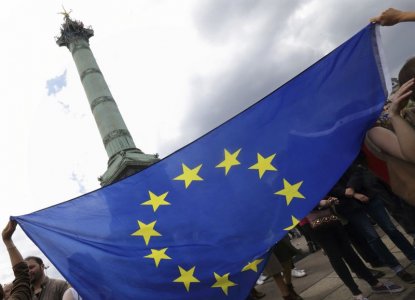
How The Eurozone Could Still Die
June 22, 2014
The tricky business of cross-cultural refereeing
June 23, 2014In 628 AD the Byzantine Emperor Herakleios advanced into Persia with his army, overthrowing the Shah of Shahs, sacking his palace and recovering the True Cross that the Persians (then Zoroastrians) had stolen from Jerusalem in a violent ant-Christian rampage a few years before. The Persians, long-time bitter rivals of the Byzantines, were defeated once and for all.
Arriving back in Constantinople in the spring of 630, Herakleios was met by the entire population, who came out to greet him “dancing with joy”. He didn’t actually use the precise words “mission accomplished” but that was the gist of it. Not only was the threat against Constantinople lifted, but the Christian Holy Places were now back in Christian hands.
So confident were the imperial military elite a couple of years later that they refused to pay the traditional subsidies in gold and precious goods to friendly tribes who guarded their southern desert frontiers. As a result, they were entirely unprepared for the conquering whirlwind that emerged from Arabia in the wake of the Prophet Muhammad’s death.
Jerusalem fell in 638 AD. Less than a hundred years later, in 732, the descendants of these desert warriors with their new religion of Islam had hacked their way as far north as Tours (just a little more than two hours drive from modern-day Paris), where they were defeated by Charles Martel (Charlemagne’s grandfather).
Edward Gibbon famously saw it as a narrow escape for Christian civilization. Without Charles Martel, he wrote, “the Arabian fleet might have sailed without a naval combat into the mouth of the Thames. Perhaps the interpretation of the Koran would now be taught in the schools of Oxford, and her pulpits might demonstrate to a circumcised people the sanctity and truth of the revelation of Mahomet.”
I doubt Baghdad will fall to Isis although Western embassies seem to be getting into their usual panic about evacuations. The Iraqi Army, despite a poor showing in some outlying areas, should be able to defend its capital city and in any case can call upon the unlimited support of Shia militias (who, if you remember, chased the British Army out of Basra in 2007), and, if necessary, the Iranian armed forces.
Nevertheless, the episode should provide a salutary lesson to Western military planners. First of all, and most obviously – except to the fellow inhabitants of Tony Blair’s analytical padded cell – the West should not intervene militarily in other countries’ affairs.
Secondly, old fanaticisms are now emerging on the world stage that do not play by the rules. They certainly do not respect borders: one of the first things Isis did last week as they broke out of Syria was to dismantle as many border posts as they could find. They regard the modern borders of the Middle East as a Western colonial imposition – which they are. We in the West seem to think that these lines drawn on a map long ago in between pink gins are somehow sacrosanct. They are not.
If a group like Isis, from a standing start, can threaten Baghdad in a few days, then nothing is safe. What is to stop a group of fanatics from descending on the tourist beaches of Cyprus, or isolated towns in the heel of Italy? We need to guard Europe’s borders.
President Putin may have designs on Ukraine but he is completely to be trusted as protector of the Eastern Marches of Christendom. Our serious vulnerabilities lie elsewhere. As Gibbon points out, the Muslim armies defeated at Tours crossed into Europe over the straits of Gibraltar and advanced a thousand miles in less than 20 years.
Our Mediterranean flank is vulnerable. I hope that our political and military leaders will eventually overcome their death wish for our way of life, realising that defending Europe’s borders is what they should have been doing all along. It’s nothing that strong naval and amphibious forces with the authority to turn away refugees and undesirables can’t handle.
But there is another much less reassuring lesson to be drawn from Gibbon’s description of the Battle of Tours – something it may be too late to fix.
He regarded it as a military miracle guaranteeing the survival of Christian Europe against what he saw as a deeply uncivilised alternative. It was to him an essential British value – unthinkable that anyone lucky enough to be living on these shores should not share it.
That many of our so-called fellow countrymen wouldn’t agree these days is worrying enough. But what really keeps me awake at night is that our lobotomised political elite would struggle to express a clear view.
Go on, some Member of Parliament unafraid of the whips or the narrow but still career-destroying banner of political correctness: ask Mr Cameron or Mr Hague on the floor of the Commons a direct question – “Do you regard the Battle of Tours as a providential victory, or a tragic defeat?” ·

